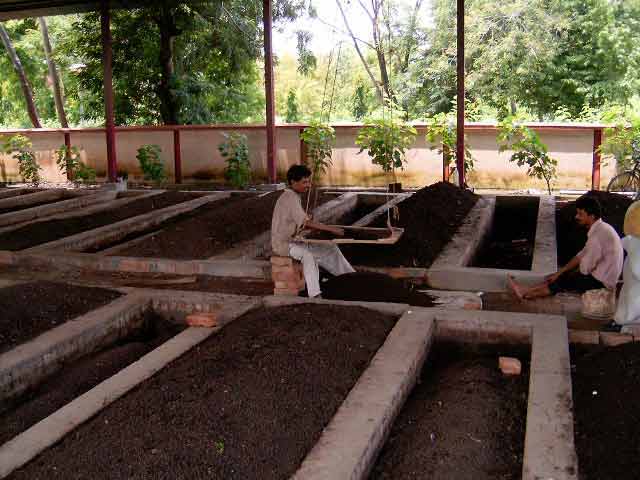Vermiculture
How to Compost with Worms
What is worm composting? Worm composting, or vermicomposting, is the process of using worm castings to make incredibly nutrient-rich compost. This is very easy to do and needs just a little bit of garden space and you can even do it in your basement or your garage. This is one great way to use up your kitchen scraps and not let it go to waste. I'm going to show you just how easy it is to compost with worms. All you need to do is think about how you want to go about it.
 First of all, you need to decide whether you want a Do-It-Yourself worm bin, or a pre-made commercial one. This decision is up to you and depends on how much time and effort you're willing to invest. For those interested in making your own bin, there are many free guides available to help you along. However, it's worth noting that if you plan on making your own, it can be a very time consuming process. Managing a single bin and sorting the castings from the soil can take quite a bit of time and may not be the best option if you're not willing to invest that effort.
First of all, you need to decide whether you want a Do-It-Yourself worm bin, or a pre-made commercial one. This decision is up to you and depends on how much time and effort you're willing to invest. For those interested in making your own bin, there are many free guides available to help you along. However, it's worth noting that if you plan on making your own, it can be a very time consuming process. Managing a single bin and sorting the castings from the soil can take quite a bit of time and may not be the best option if you're not willing to invest that effort.
If you plan on buying a bin, we recommend reading some of our worm bin reviews to get an idea of what is available. Most commercial bins available encourage upward migration of the worms which separates them from the castings. This design eliminates much of the effort and hassle of maintaining a
worm bin, but it comes at a cost. Some worm bins can be expensive, so be sure
you know what you're getting before you buy.
After deciding what avenue to take, actually producing the compost is a breeze! The simple fact is that the worms are the ones who will be doing all the work. If you have tried traditional composting methods before, you know it's a very time consuming an arduous process having to turn and aerate the compost by hand. Worm composting eliminates all these problems as the worms, on instinct alone, will be the ones doing these dirty jobs.
The first step for any composting bin is to lay down some bedding for the worms. Bedding can consist of a number of things; soil, compost, shredded newspaper, eggshells, leaves, sand, etc. The goal is to make them a small meal to feel them more at home as they acclimate to their surroundings. After this stage, you can begin gradually adding food to the bin. Worms will find food that is broken up, soft, or moist particularly delicious. However, meat, diary products, and citrus fruits should be avoided.
It should take around 3 months for the worms to turn any kitchen scraps or waste into worm compost. Depending on what type of bin you have, after the worms have begun to go through the scraps you've laid out, you'll want to add more scraps to the other side of the bin, or on a higher tray. Placing food on the next tray will encourage the worms to migrate upwards as their food supply on the current tray is exhausted. As the worms continue to crawl up searching for food, it becomes very easy to harvest the worm compost in the bottom tray. If you've taken the DIY route, you will need to manually separate the worm compost from the other materials.
How Worm Compost Works
Now how do you use the worm compost that you have made? Compost is organic matter that is really great for your plants. You can add it to your lawn, your plants in the garden or your potted plants. You'll find the soil improving with better aeration and moisture-holding properties. This is where your plants will get their nutrients from and thrive. You can also use it as mulch, spreading it on top of the soil after mixing it with a bit of topsoil. You'll also find worm compost helps prevent many diseases.
 You'll find in your garden that all the organic matter does decompose eventually. However, worm composting hastens the process and gives you garden soil that is fertile, moist and rich in nutrients. Your plants will grow better, look better and survive better. All it takes for organic matter to decompose are ideal conditions in which worms, bacteria, fungi and bugs can work together.
You'll find in your garden that all the organic matter does decompose eventually. However, worm composting hastens the process and gives you garden soil that is fertile, moist and rich in nutrients. Your plants will grow better, look better and survive better. All it takes for organic matter to decompose are ideal conditions in which worms, bacteria, fungi and bugs can work together.
All these elements need moisture, oxygen, carbon and nitrogen. So if you were to mix in nitrogen-rich substances like vegetable scraps or plant matter, you'll find decomposing happening quicker. Carbon can be had from leaves and paper. It's important to remember that you need a balance of both nitrogen and carbon iin your worm bin.

